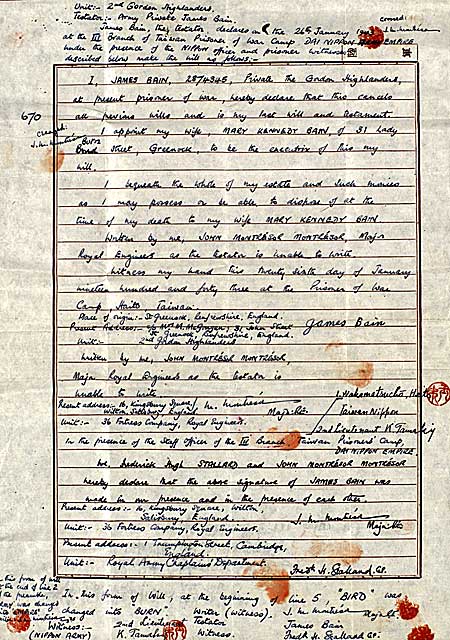|

NAS: SC70/8/1334/512
|
I, James Bain….Private, The Gordon Highlanders, at
present prisoner of war, hereby declare that this cancels
all previous wills and is my last will and testament. I appoint
my wife, Mary Kennedy Bain, of 31 Lady Burn Street, Greenock,
to be the executrix of this my will.
I bequeath the whole of my estate and such monies as I may
possess or be able to dispose of at the time of my death to
my wife Mary Kennedy Bain.
Witness my hand this twenty sixth day of January, nineteen
hundred and forty three at the Prisoner of War Camp, Haito,
Taiwan.
Written by me, John Montresor Montresor, Major, Royal Engineers,
as the testator is unable to write.
|
 |
|
|
|
 |
| |
1.The impact of war on families
Having studied Private Bain’s will, how does it
make you feel?
Discuss your reactions in groups or pairs and write
2-3 paragraphs summarising your views on the impact
of war.
Consider the following points
• Families are split up when members
join the forces
• War brings uncertainty, fear, anxiety and
hardship
• War can divide family loyalties
• Civilians are the innocent victims of war
Group discussion
topics
1. Is war right or wrong?
The philosophers Jeremy Bentham and John Stuart Mill
advocated Utilitarianism and the belief that an action
is right if it and its consequences produce the greatest
good for the greatest number of people.
|
|
Immanuel Kant took a different view in deciding
if an action is right or wrong. He advocated rational
behaviour, the strength of motive behind people’s
actions and the strength of universal rules that would
govern society’s treatment of fellow human beings
as respected and valued individuals.
Select one of the theories, Utilitarianism
and Kantism and list two arguments to support or to
oppose the statement above.
Points to consider:
• Short and long term consequences
of war
• Duty is a sound motive for action
• Putting yourself before others
• The rights of the citizen
2. The Geneva and Hague Conventions and the United Nations
have made little impact on peace in the world as major
conflicts continue to this day.
To help you in your discussion, visit background
information on the Geneva and Hague Conventions
and the United Nations. |
|
 |
|
|
|
 |
|



